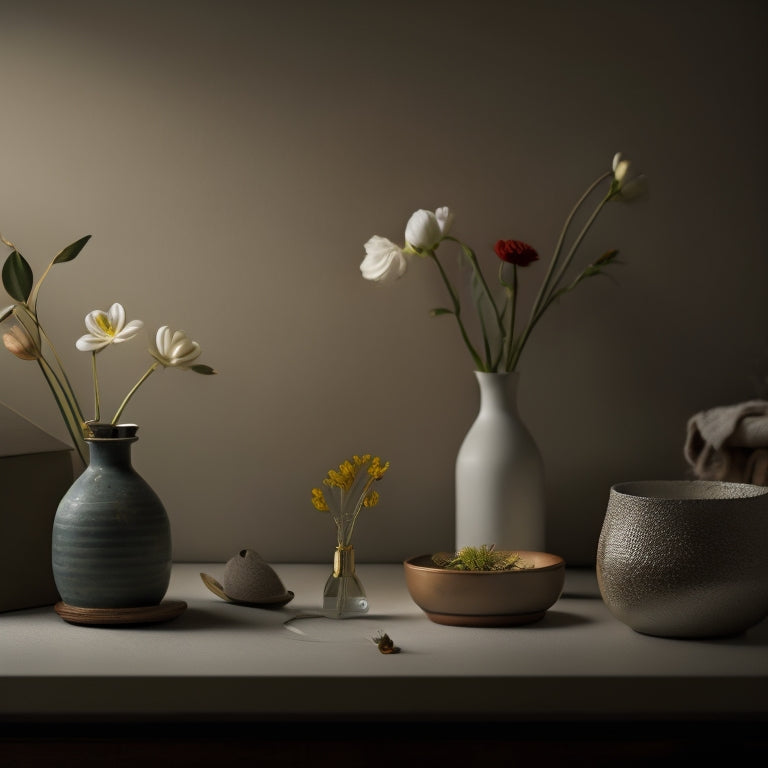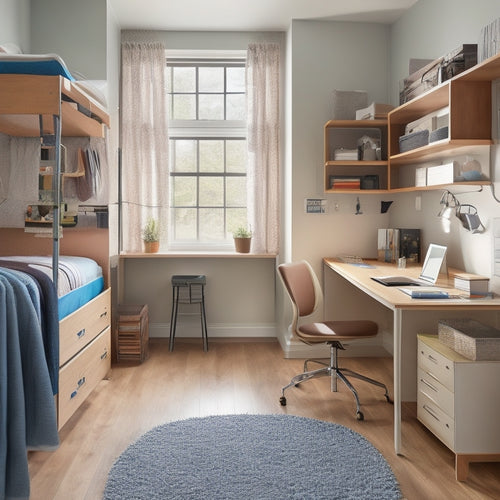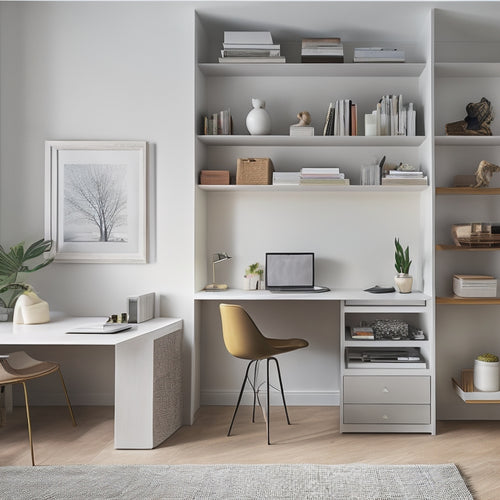
What's Holding You Back From a Clutter-Free Life?
Share
You're standing in the way of your own clutter-free life, and it's likely due to one of five common obstacles. You might be holding onto possessions because of emotional attachment, fearing that letting go means losing memories or emotions. Or, you may lack the skills to declutter, feeling overwhelmed by the task. Guilt could be crippling your progress, triggered by sentimental items, waste, or unmet expectations. Perhaps you're struggling to create systems to maintain order, feeling paralyzed by the idea of getting started. Identify which obstacle is holding you back, and you'll be one step closer to breaking free and revealing a more organized, clutter-free you.
Key Takeaways
• Emotional attachment to clutter often stems from items tied to memories or emotions, making it hard to let go of sentimental value.
• Fear of losing memories or emotions forever can be overcome by understanding that memories aren't in the physical objects themselves.
• Lack of decluttering skills can be addressed by learning strategies like categorizing, prioritizing, and decision-making, and seeking help if needed.
• Overwhelming guilt triggered by sentimental items, waste, or unmet expectations can be acknowledged and overcome by recognizing feelings without getting stuck.
• Inability to create systems to maintain order can be addressed by starting small, focusing on one area at a time, and forming habits through routines.
Emotional Attachment to Clutter
As you start to declutter your space, you'll likely discover that certain items are hard to part with because they're tied to memories, emotions, or a sense of identity. These items are what we call 'memory anchors,' holding onto the past and the emotions attached to them. It's not the item itself that's precious, but the sentimental value it holds.
Perhaps it's a gift from a loved one, a souvenir from a memorable trip, or a piece of clothing that reminds you of a special occasion.
To overcome this emotional attachment, take a step back and acknowledge the memory or emotion tied to the item. Recognize that the memory or emotion is what's truly important, not the physical object itself.
Ask yourself if keeping the item is truly worth the clutter it's causing in your life. Consider taking a photo of the item, journaling about the memory, or creating a digital archive of your keepsakes. By doing so, you can preserve the sentimental value while freeing yourself from the clutter.
Fear of Letting Go Forever
You're likely holding onto clutter because you're afraid that letting go of an item will erase the memory or emotion it represents, leaving you with a sense of loss or emptiness. This fear is rooted in the sentimental value you've attached to these items. You believe that by keeping them, you'll preserve the memories and emotions associated with them.
| Fear | Reality |
|---|---|
| Losing memories | Memories remain, but clutter goes |
| Emptiness and loss | Space and freedom are gained |
| Permanent loss | Items can be replaced or recreated |
| Erasing emotions | Emotions remain, but clutter's weight is lifted |
The truth is, the memories and emotions aren't in the items themselves, but in your mind and heart. By letting go of the physical objects, you're not erasing the memories or emotions; you're simply releasing the weight of the clutter. You'll still have the sentimental value, but without the burden of physical clutter. Remember, the memories and emotions will always be with you, even if the items are gone.
Lack of Decluttering Skills
Decluttering can feel overwhelming when you're unsure where to start or how to tackle your accumulated belongings. It's like staring at a messy room, wondering how you'll ever get everything organized. But here's the thing: decluttering is a skill that can be learned. You don't have to be a natural-born organizer to get your space in order. With the right strategies and mindset, you can develop the skills you need to declutter like a pro.
Consider enrolling in a decluttering bootcamp or working with a professional organizer who can guide you through the process. They'll teach you skill-building strategies like categorizing, prioritizing, and decision-making techniques that'll help you tackle even the toughest clutter hotspots.
You'll learn how to identify what's truly important to you and what's just taking up space. As you practice these skills, you'll become more confident in your ability to declutter and maintain your space. Remember, decluttering is a journey, and it's okay to start small. With patience, persistence, and the right support, you can overcome your lack of decluttering skills and create a clutter-free life that feels amazing.
Overwhelming Sense of Guilt
Get stuck in the emotional quagmire of guilt, and you'll never make progress on your decluttering journey. Guilt can be a major roadblock, especially when it comes to letting go of items that hold sentimental value or remind you of past mistakes. You might feel guilty for spending money on something that's now cluttering your space or for not using an item that was given to you as a gift.
Here are three common guilt triggers to watch out for:
-
Sentimental items: You feel guilty for getting rid of items that hold memories or were given to you by someone special.
-
Waste and extravagance: You're ashamed of wasting money on something that didn't turn out to be useful or worth the investment.
-
Unmet expectations: You feel guilty for not meeting your own expectations or living up to someone else's standards.
Recognize that these guilt triggers can lead to shame cycles, where you beat yourself up over past mistakes and feel stuck in your decluttering journey. The key is to acknowledge these feelings, but not let them define your actions. By becoming aware of your guilt triggers, you can start to break free from their hold and make progress towards a clutter-free life.
Inability to Create Systems
Without a clear plan of attack, clutter tends to creep back in, making it essential to create systems that maintain order and prevent chaos from resurging. You might think you're doing okay, but without a system, you're just one unexpected event away from being overwhelmed again. That's why habit formation is vital. By creating routines and systems, you can maintain your space with minimal effort.
However, many people struggle with system paralysis – the feeling of being so overwhelmed by the thought of creating a system that you don't start at all. Don't let that be you! Start small and focus on one area at a time.
| Area | Current State | Desired State |
|---|---|---|
| Kitchen Counters | Cluttered and messy | Clear and organized |
| Closet | Overwhelming and stressful | Peaceful and functional |
| Desk | Chaotic and disorganized | Calm and productive |
Take the first step today, and you'll be on your way to a clutter-free life. Remember, it's not about being perfect; it's about creating a system that works for you and helps you maintain your space.
Frequently Asked Questions
How Do I Handle Clutter That Holds Sentimental Value From a Deceased Loved One?
When dealing with sentimental clutter from a deceased loved one, you're managing grief and legacy. Create a Memory Box to store select items, then sort and release others, honoring your loved one's memory while embracing a clutter-free life.
Can I Become a Minimalist if I Live With a Clutter-Loving Partner or Family?
You can still pursue minimalism while living with a clutter-loving partner or family by finding common ground, employing compromise strategies, and setting clear boundaries that respect everyone's needs, allowing you to maintain your space and sanity.
What if I Need Items for a Future Project or Business Venture?
You're wise to think ahead, but don't let future plans hold you back from decluttering. Designate business storage for must-keep items, and set a deadline to revisit them - if they're still useful, you'll know it's meant to be.
Is It Worth the Time and Effort to Declutter if I'm Short on Space?
"Oh, you're wondering if decluttering is worth it when space is scarce? Please, by all means, trip over your cluttered chaos daily, wasting precious time searching for what you need. But, seriously, prioritize space efficiency and apply smart strategies to maximize your tiny territory – it's worth the effort!"
How Do I Maintain My Decluttered Space When I Have Young Children?
You'll master maintaining your decluttered space with young children by implementing Toddler Tricks like toy rotation and Parenting Hacks like designated play zones, ensuring a clutter-free haven that's both fun and functional for your little ones.
Related Posts
-

10 Essential Storage Hacks for College Dorms
You'll need to get creative with storage to make the most of your college dorm room's limited space. Start by maximiz...
-

7 Essential Strategies for More Storage Space
Take back control of your space by implementing these 7 essential strategies for more storage space. Start by maximiz...

